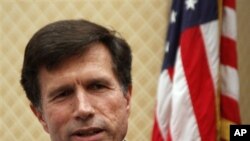The United States and China are playing up areas of common interest in South Asia, rather than focusing on more contentious issues like Tibet or China's nuclear deal with Pakistan.
The top US diplomat for South and Central Asia, Robert Blake, said he had "very productive discussions" with Chinese officials in Beijing about developments in South Asia.
"The US is very aware of China's important role in the region," said Blake. "We welcome China as a strong, prosperous and successful member of the international community. We see South and Central Asia as one of the most diverse yet least integrated regions in the world."
Blake said Washington and Beijing share common concerns with regard to counter-narcotics and counterterrorism.
He acknowledged that the issue of Tibet's exiled spiritual leader, the Dalai Lama, did not come up in his meetings with Chinese officials. The Dalai Lama fled China in 1959, and has since lived in exile in India. Beijing accuses him of working for independence for Tibet, while he accuses China of suppressing Tibetan culture and religion.
Blake also commented on a nuclear deal between China and Pakistan. He expressed Washington's displeasure with China's agreement to provide nuclear reactors to Pakistan, although he stopped short of outright opposing it.
"We expect China to abide by the commitments that it made when it joined the Nuclear Suppliers' Group in 2004," said Blake. "And in particular, we think that construction of new nuclear reactors, such as the Chasma 3 and 4, would be inconsistent with those commitments."
The Carnegie Endowment for International Peace's Mark Hibbs says the United States may not approve of the China-Pakistan nuclear deal, but is not expected to loudly oppose it either.
"The United States is sensitive to the matter because in 2008, the United States strongly urged other countries in the Nuclear Suppliers' Group to provide an exemption to India and permit India to obtain nuclear equipment from western and advanced countries without having its nuclear program covered by the NPT [nuclear non-proliferation treaty] or subject to international inspection, and Pakistan and China are expecting reciprocity," noted Hibbs.
He said the issue likely will be debated at the Nuclear Suppliers' Group's annual meeting later this year.
Blake said he did not discuss the issue of China-Pakistan nuclear cooperation in his meetings with Chinese officials. But he said Washington supports further development of the energy sector in Pakistan, as an important component of that country's overall development.
He described Pakistan's energy shortages as "quite severe" and urged the international community to do "as much as possible" to help the country meet its energy needs. Blake added, though, that the United States believes this assistance does not have to include help with nuclear power.
US Envoy Stresses Cooperation with China in South Asia
- By Stephanie Ho






